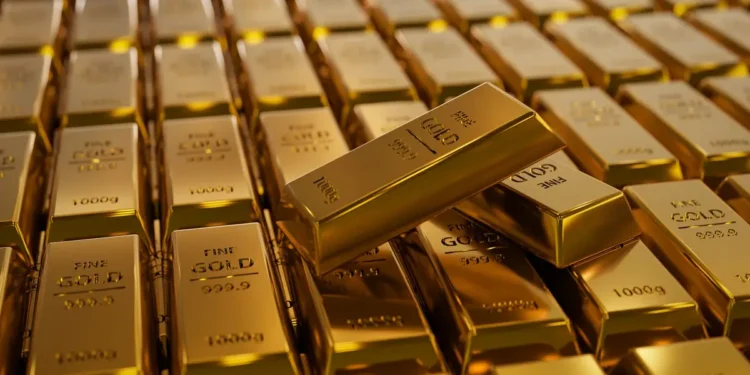On January 1, 2026, a tax exemption for precious metals and bullion will be repealed.
“People will be impacted, and be forced out of state by it, and it’s not going to be good,” CFO of Bellevue Rare Coins, Ryan Hoolahan said.
The tax repeal will mean precious metals and bullion will be subject to business and occupation, sales, and use taxes.
This is exactly what is taxable, as defined by the state:
Precious metal bullion: any precious metal which has been put through a process of smelting or refining, including, but not limited to, gold, silver, platinum, rhodium, and palladium, and which is in such state or condition that its value depends upon its contents and not upon its form.
Monetized bullion: coins or other forms of money manufactured from gold, silver, or other metals and heretofore, now, or hereafter used as a medium of exchange under the laws of this state, the United States, or any foreign nation, but does not include coins or money sold to be manufactured into jewelry or works of art.
Enacting this tax comes after the Joint Legislative Audit and Review Committee found that the exemption “may not be achieving the inferred public policy objective of making Washington coin and bullion dealers more competitive with out-of-state competitors by treating precious metal and bullion sales like sales of investment rather than sales of tangible personal property.”
But Hoolahan thinks the opposite will be true, and that Washington state will become less competitive as gold hits record-high prices of more than $4,000 for one ounce.
“It takes the ability to be able to look at gold as an investment away from Washingtonians,” he said. “Because no investment with a 10% tax out of the gate is an investment. That’s a poor investment to take a 10% penalty right out of the gate.”
He said the repeal of this tax exemption came without warning, and is telling people who might want to invest in gold to do so before 2026.
“I’m not going to be advising my customers to buy gold with a 10% sales tax on it,” Hoolahan said. “So, what’s going to happen is the sales won’t be there, the money won’t be there, the revenue (to the state) won’t be there.”
Hoolahan said he worries people will be drawn to sketchy online websites to buy gold, without the tax, and ultimately end up scammed.
“People are going to go spend $4,000 for an ounce of gold, or maybe they think they’re getting a good deal for $3,500 and, ‘Oh my gosh, we’re getting a great deal,’ but you’re going to buy something that’s worth zero.”
He said it is difficult to tell the difference between counterfeit products, especially online, and without expensive equipment to detect whether it is a real ounce of gold or only gold-plated.
Other tax preferences that will be sunset or be repealed on January 1 include:
Interest on real estate loans B&O tax deduction; Prescription drug resellers preferential B&O tax rate; Insurance producers, title insurance agents, and surplus line brokers preferential B&O tax rate; Home energy assistance PUT credit; Dentistry prepayments insurance premiums tax exemption; International investment management services preferential B&O tax rate; International services B&O tax credit; and International banking facilities B&O tax exemption.
The 10% combined tax burden from sales tax and B&O tax creates immediate loss on precious metal investments that investors must recover through price appreciation before realizing any gains, fundamentally altering the risk-reward calculation for Washington residents considering gold or silver as inflation hedges.
The timing of the repeal as gold reaches record highs above $4,000 per ounce maximizes revenue impact for the state while creating maximum pain for dealers like Bellevue Rare Coins, whose sales volumes will generate substantial tax collections during the brief window before customers shift purchasing behavior.
JLARC’s finding that the exemption failed to make Washington dealers competitive contradicts industry claims, suggesting either the committee misunderstood precious metals markets or that Washington dealers already struggled against out-of-state competition even with the tax advantage.
The broader package of expiring tax preferences including real estate loan interest deductions and international banking facility exemptions reflects legislative strategy to generate revenue through multiple smaller changes rather than high-profile tax increases that attract organized opposition.
Hoolahan’s prediction that customers will shift to online purchases from out-of-state dealers mirrors patterns in other high-tax-differential products, where Washington consumers routinely cross borders or buy remotely to avoid sales taxes on major purchases.
The counterfeit gold warning highlights legitimate consumer protection concerns, as online precious metals fraud has proliferated with sophisticated fake products that defeat casual inspection, requiring X-ray fluorescence analyzers or acid tests to verify authenticity.
Bellevue Rare Coins’ Eastside location serves affluent clientele who historically used precious metals for portfolio diversification and inflation protection, making the tax particularly impactful in wealthy suburbs where investment-grade bullion purchases concentrate.
The lack of warning about the exemption repeal suggests either poor communication from state officials or legislative processes where tax preference eliminations receive less public notice than new tax proposals, catching affected industries unprepared for advocacy.
The January 1 implementation creates a December 2025 rush as investors accelerate purchases to avoid the tax, generating short-term revenue spike for dealers followed by potential cliff in 2026 as the tax takes effect.
The distinction between monetized bullion and jewelry or art maintains tax exemption for numismatic coins valued for collectibility rather than metal content, preserving a niche market while taxing investment-grade bullion that competes with stocks and bonds.







